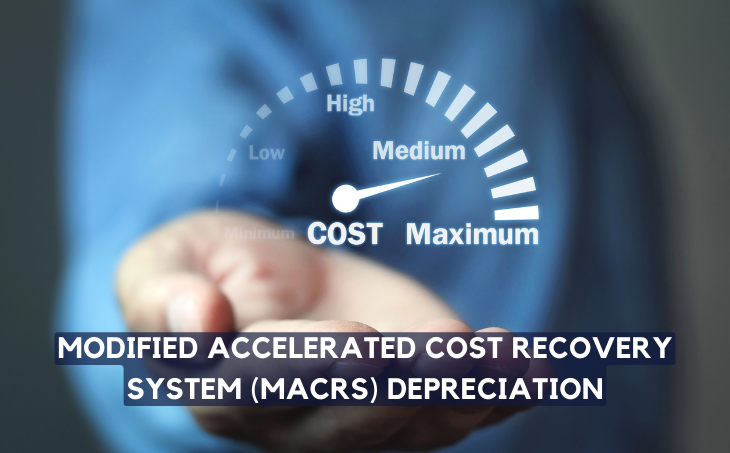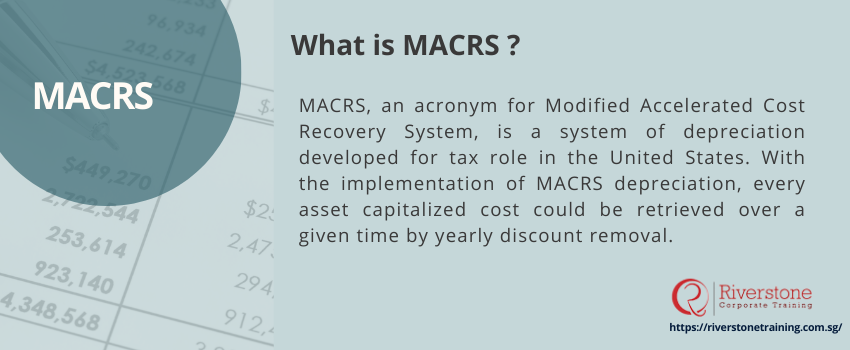
Modified Accelerated Cost Recovery System (MACRS) Depreciation:
MACRS, an acronym for Modified Accelerated Cost Recovery System, is a system of depreciation developed for tax role in the United States. With the implementation of MACRS depreciation, every asset capitalized cost could be retrieved over a given time by yearly discount removal. Modified Accelerated Cost Recovery System is developed by IRS (Internal Revenue Service), which expected to observe a higher depreciation rate in its first year and then the future reduction in the coming years. While MACRS applies to the U.S. tax system, businesses in Singapore follow the types of depreciation methods used in Singapore accounting standards, which differ in approach and are aligned with the requirements of the Inland Revenue Authority of Singapore (IRAS) and SFRS.
What Does Modified Accelerated Cost Recovery System (MACRS) Mean?
Both MACRS and GAAP (Generally Accepted Accounting Principle) double declining method are similar in the sense that higher depreciation is charged in the first year while the lesser cost charged in the subsequent years of the useful asset life. This system is sound because asset generally is always more helpful in the beginning years because they are still brand new at that time.
A perfect example has been explained here is a laptop with a useful life of 5 years. It is no doubt that the computer would work at its peak in the first two years while subsequent years might be slower because of the intention of new sophisticated software that is the best fit for new pc.
Below are the critical information that must take note of,
- The modified accelerated recovery system gives room for businesses to retrieve all essential costs of specific assets which believed to degenerate over time.
- The Internal Revenue Service is in charge of giving guidelines on eligible assets for MACRS, and also, they provide a useful life used.
Understanding the Modified Accelerated Cost Recovery System (MACRS)
Depreciation is a deduction on income tax allowing the business to retrieve the essential cost of specific properties. The deduction is a yearly allowance for degeneration, obsolescence, or wearing of the property (asset). Asset depreciates and also, the intangible asset is depreciable. In relation to tax and financial clarity, understanding revenue vs income for business profitability in Singapore becomes vital, especially when considering how depreciation affects reported earnings and investment decisions.
A proper method of property depreciation is MACRS. Using MACRS is profitable because businesses and individuals can remove a significant amount during the early years of an asset since the technique allows accelerated deprivation for a longer time. Examples of asset that fits for the application of this method include automobiles, computers, office furniture, etc.
MACRS Depreciation Methods
Macrs provides business with two basic depreciation schemes within its risk known as the General Depreciation System (GDS) and the Alternative Depreciation System (ADS) with different calculations. GDS, commonly utilizing accelerated methods like the Declining Balance (e.g., 200% or 150%), allows businesses to deduct a larger portion of an asset’s cost earlier in its useful life, significantly reducing taxable income sooner. In contrast, the Straight-Line method, often used under ADS or for specific assets, spreads the depreciation deduction evenly over the asset’s recovery period. These techniques are essential to tax planning as each business must understand the most beneficial way to use them depending on the type of assets that one has and the intentions that one has regarding his/her finances to remove the maximum number of discounts per year. Professionals looking to deepen their understanding of these tax strategies can benefit from the best business valuation course for professionals in Singapore, while entrepreneurs may gain strategic insights from practical financial modeling for startup founders Singapore.
Tax Benefits of MACRS Depreciation
The Modified Accelerated Cost Recovery System (MACRS) provides a big tax advantage in that, the business is permitted to recover assets costs at an accelerated rate, which faster recapture of such costs helps to decrease the taxable income of the business at earlier and faster rate. By enabling larger depreciation deductions in the earlier years of an asset’s useful life, MACRS effectively defers tax payments, improving cash flow and providing capital for reinvestment or debt reduction. One idea business can use strategically is to accelerate this depreciation to offset their current efficiency so that when they already made huge investments in newer equipment or technology they can write off their current performance. The tax planning is one of the elements to maximize MACRS deductions which means that businesses will utilize the provided tax incentives to improve the financial performance and encourage growth. Understanding the difference between EBT EBITDA and PAT in financial reporting Singapore can further enhance the effectiveness of such strategies, ensuring a clearer picture of profitability during tax planning and capital allocation.


